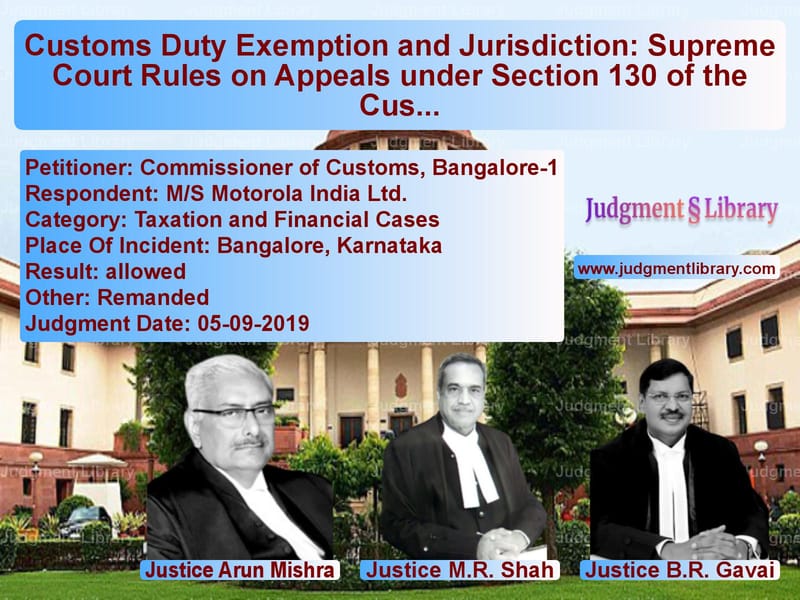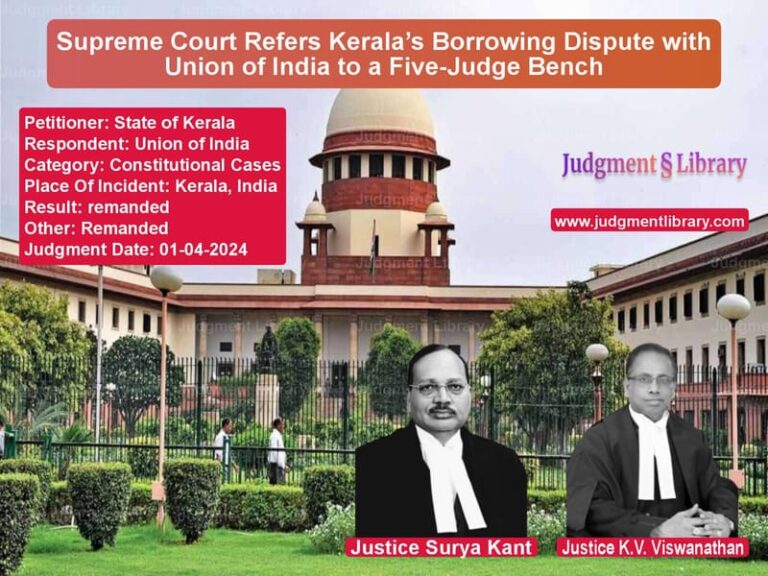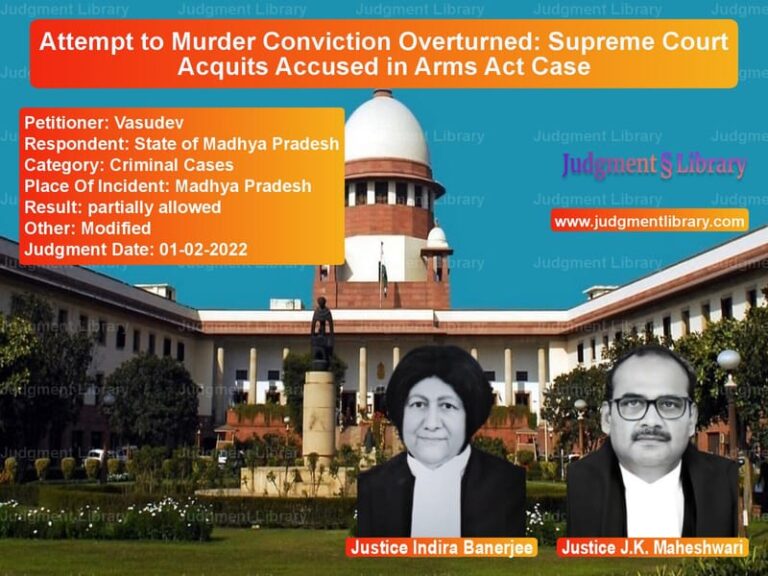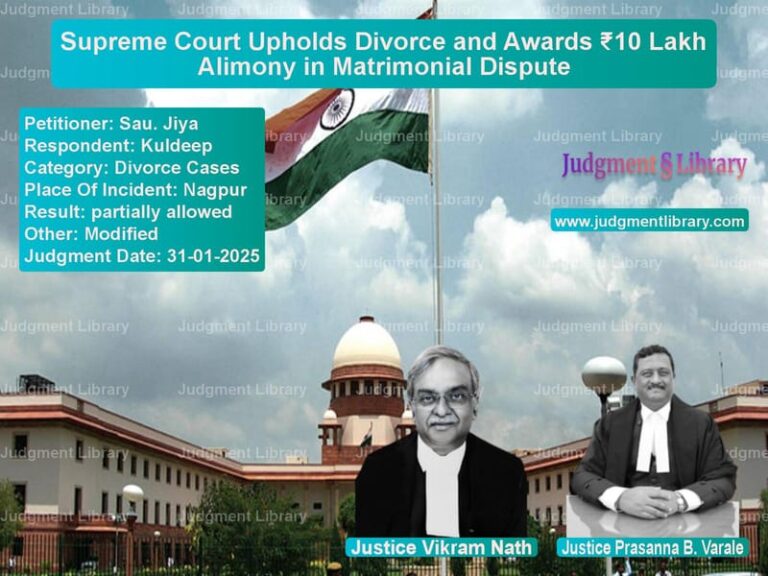Customs Duty Exemption and Jurisdiction: Supreme Court Rules on Appeals under Section 130 of the Customs Act
The Supreme Court of India recently ruled in the case of Commissioner of Customs, Bangalore-1 vs. M/S Motorola India Ltd., clarifying the jurisdiction of appeals under Section 130 and Section 130E of the Customs Act, 1962. The case revolved around the violation of conditions under a customs exemption notification and whether such an appeal should be heard by the High Court or the Supreme Court.
Background of the Case
The respondent, M/S Motorola India Ltd., was a manufacturer of pagers and had availed the benefit of Customs Notification No. 30/1997, which provided duty-free import of materials used in the manufacture of pagers. The notification mandated that the imported materials must be used exclusively for manufacturing the final product. However, investigations by the Directorate of Revenue Intelligence (DRI) revealed that Motorola had ceased manufacturing pagers but had unutilized duty-free materials, violating the conditions of the exemption.
Based on this, the Commissioner of Customs, Bangalore, issued a notice demanding a customs duty of Rs. 96,17,498 plus interest at 24% per annum, along with penalties. The Commissioner’s order was challenged before the Customs, Excise, and Service Tax Appellate Tribunal (CESTAT), which ruled in favor of Motorola. The Revenue then appealed to the Karnataka High Court under Section 130 of the Customs Act.
Legal Issues Considered
- Whether the High Court had jurisdiction to hear an appeal regarding the violation of conditions under a customs exemption notification.
- Whether such cases should be heard exclusively by the Supreme Court under Section 130E of the Customs Act.
- The distinction between cases involving the rate of duty or valuation of goods and those involving customs exemption violations.
Arguments by the Commissioner of Customs (Petitioner)
The Revenue department presented the following arguments:
- The appeal before the High Court was valid under Section 130 of the Customs Act as it involved substantial questions of law.
- The case did not concern the rate of duty or valuation of goods, which are the only grounds for direct appeals to the Supreme Court under Section 130E.
- The Tribunal had erred in setting aside the Commissioner’s demand order without properly considering the conditions of the exemption notification.
- Exemption notifications impose mandatory conditions, and any violation should lead to the reversal of the duty exemption.
Arguments by Motorola India Ltd. (Respondent)
The respondent countered the petitioner’s claims with the following arguments:
- The case involved interpretation of customs duty exemptions, which is a matter related to the rate of duty and should be appealed directly to the Supreme Court under Section 130E.
- The company had ceased manufacturing pagers, and the unused materials had become obsolete, making them ineligible for use in production.
- The decision of CESTAT was based on factual findings, and the High Court should not interfere in factual determinations.
- The High Court lacked jurisdiction, and the Revenue should have directly approached the Supreme Court.
Supreme Court’s Observations
The Supreme Court analyzed the distinction between appeals under Section 130 (which go to the High Court) and Section 130E (which go to the Supreme Court). The key observations were:
- Under Section 130, appeals against CESTAT orders involving substantial questions of law (excluding rate of duty or valuation) should be filed in the High Court.
- Under Section 130E, appeals concerning the rate of duty or valuation of goods for assessment purposes go directly to the Supreme Court.
- The present case did not involve rate of duty or valuation but rather violation of conditions in a customs exemption notification, making it a fit case for the High Court.
- Past judgments, including Navin Chemicals Manufacturing & Trading Co. Ltd. vs. Collector of Customs, established that exemption conditions do not relate to the rate of duty.
- The High Court erred in declining jurisdiction and referring the matter to the Supreme Court.
Final Judgment
The Supreme Court ruled in favor of the Revenue and held that the Karnataka High Court wrongly refused to hear the appeal. The case was remanded back to the High Court for fresh consideration on its merits.
The Court concluded:
“The appeals do not involve any question of law of general public importance which would be applicable to a class or category of assessees as a whole. The question is purely inter-se between the parties and is required to be adjudicated upon the facts available.”
Implications of the Judgment
- For Businesses: Companies availing customs exemptions must ensure strict compliance with notification conditions to avoid reversal of benefits.
- For Tax Practitioners: Clarifies that not all customs-related cases can be directly appealed to the Supreme Court. Only cases concerning rate of duty or valuation of goods qualify under Section 130E.
- For the Judiciary: The ruling establishes clear jurisdictional boundaries, ensuring that High Courts handle exemption-related disputes.
- For Government Authorities: Strengthens the enforcement of customs exemption conditions by confirming that violations can be reviewed by High Courts.
Conclusion
The Supreme Court’s ruling in this case provides clarity on the jurisdiction of appeals under the Customs Act. It reinforces the principle that only cases involving rate of duty or valuation go directly to the Supreme Court, while other customs-related disputes, including exemption violations, must be decided by High Courts first. This decision strengthens legal certainty for businesses, government authorities, and legal practitioners dealing with customs law.
Petitioner Name: Commissioner of Customs, Bangalore-1.Respondent Name: M/S Motorola India Ltd..Judgment By: Justice Arun Mishra, Justice M.R. Shah, Justice B.R. Gavai.Place Of Incident: Bangalore, Karnataka.Judgment Date: 05-09-2019.
Don’t miss out on the full details! Download the complete judgment in PDF format below and gain valuable insights instantly!
Download Judgment: Commissioner of Cust vs MS Motorola India L Supreme Court of India Judgment Dated 05-09-2019.pdf
Direct Downlaod Judgment: Direct downlaod this Judgment
See all petitions in Customs and Excise
See all petitions in Tax Refund Disputes
See all petitions in Income Tax Disputes
See all petitions in Judgment by Arun Mishra
See all petitions in Judgment by Mukeshkumar Rasikbhai Shah
See all petitions in Judgment by B R Gavai
See all petitions in allowed
See all petitions in Remanded
See all petitions in supreme court of India judgments September 2019
See all petitions in 2019 judgments
See all posts in Taxation and Financial Cases Category
See all allowed petitions in Taxation and Financial Cases Category
See all Dismissed petitions in Taxation and Financial Cases Category
See all partially allowed petitions in Taxation and Financial Cases Category







